
Mokpo: The Gateway to Korea's Maritime Heritage
Mokpo, nestled on the southwestern tip of South Korea, is a charming coastal city that beautifully blends history, culture, and natural beauty. Known for its stunning ocean views and rich maritime history, Mokpo offers a unique escape from the bustling life of larger cities. The city's scenic waterfront, dotted with traditional Korean houses and modern buildings, provides an idyllic setting for leisurely strolls and picturesque sunsets. The city is a treasure trove of cultural sites, including the Mokpo Modern History Museum, which offers insights into the city's past, and the Gatbawi Rock, a natural monument that stands as a testament to Mokpo's geological heritage. For nature lovers, the Yudal Mountain offers hiking trails with panoramic views of the city and the surrounding sea. Food enthusiasts will delight in Mokpo's fresh seafood markets and local delicacies such as 'hongeo' (fermented skate) and 'galchi' (hairtail fish). The bustling Mokpo Fish Market is a must-visit for an authentic taste of the city's culinary offerings. Additionally, Mokpo serves as a gateway to the nearby archipelago of the Dadohaehaesang National Park, perfect for island-hopping adventures and marine exploration.
Local tips in Mokpo
- Visit the Mokpo Modern History Museum to understand the city's past and its development.
- Hike up Yudal Mountain for stunning panoramic views of Mokpo and the surrounding sea.
- Explore the bustling Mokpo Fish Market for the freshest seafood and local delicacies.
- Take a ferry from Mokpo to explore the beautiful Dadohaehaesang National Park islands.
- Try the local specialty, hongeo (fermented skate), for a true taste of Mokpo's unique cuisine.
Mokpo: The Gateway to Korea's Maritime Heritage
Mokpo, nestled on the southwestern tip of South Korea, is a charming coastal city that beautifully blends history, culture, and natural beauty. Known for its stunning ocean views and rich maritime history, Mokpo offers a unique escape from the bustling life of larger cities. The city's scenic waterfront, dotted with traditional Korean houses and modern buildings, provides an idyllic setting for leisurely strolls and picturesque sunsets. The city is a treasure trove of cultural sites, including the Mokpo Modern History Museum, which offers insights into the city's past, and the Gatbawi Rock, a natural monument that stands as a testament to Mokpo's geological heritage. For nature lovers, the Yudal Mountain offers hiking trails with panoramic views of the city and the surrounding sea. Food enthusiasts will delight in Mokpo's fresh seafood markets and local delicacies such as 'hongeo' (fermented skate) and 'galchi' (hairtail fish). The bustling Mokpo Fish Market is a must-visit for an authentic taste of the city's culinary offerings. Additionally, Mokpo serves as a gateway to the nearby archipelago of the Dadohaehaesang National Park, perfect for island-hopping adventures and marine exploration.
When is the best time to go to Mokpo?
Iconic landmarks you can’t miss
Mokpo Cable Car Gohado Stop
Discover breathtaking views of Mokpo from the Mokpo Cable Car Gohado Stop, a thrilling journey above stunning landscapes.
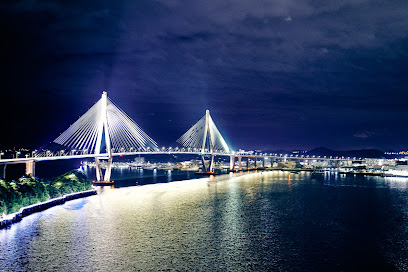
Mokpo Marine Cable Car
Soar high above the stunning landscapes of Mokpo on the Marine Cable Car, where breathtaking views await at every turn.
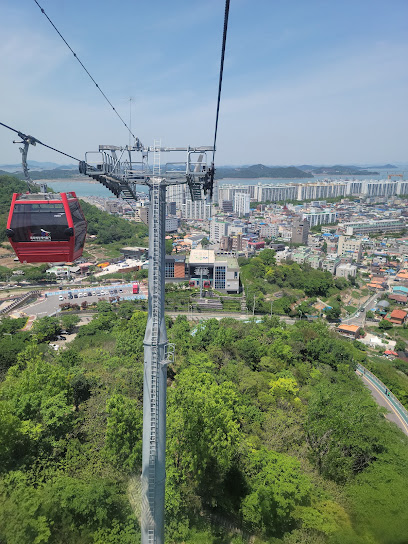
Mokpo Modern History Hall 1 (Former Mokpo Japanese Consulate)
Explore the rich history of Mokpo at the Mokpo Modern History Hall, a museum that unveils the city's fascinating stories from the modern era.
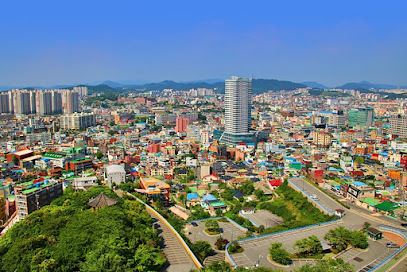
Mokpo Gatbawi Rock
Experience the breathtaking beauty of Mokpo Gatbawi Rock, a serene nature preserve with stunning coastal views and rich cultural heritage.
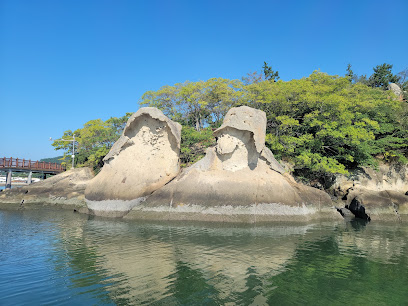
평화광장
Experience the lively atmosphere and cultural essence of Mokpo at Pyeonghwa Plaza, the city's vibrant heart.
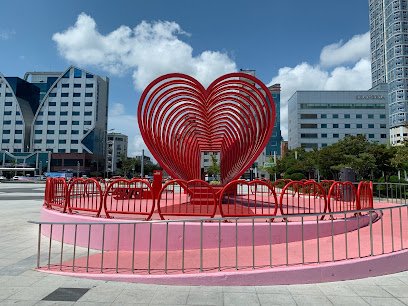
Hotel Hyundai by Lahan Mokpo
Discover the tranquil luxury of Hotel Hyundai by Lahan Mokpo, a perfect retreat in South Korea's picturesque Jeollanam-do region.

Mokpo Natural History Museum
Explore the Mokpo Natural History Museum, a fascinating journey through Korea's rich natural heritage in the heart of Jeollanam-do.
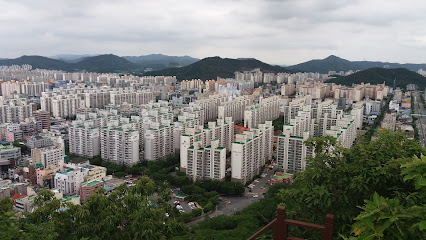
동부시장
Discover the vibrant Mokpo Traditional Market, where local flavors and crafts come alive in a bustling atmosphere that embodies Korean culture.
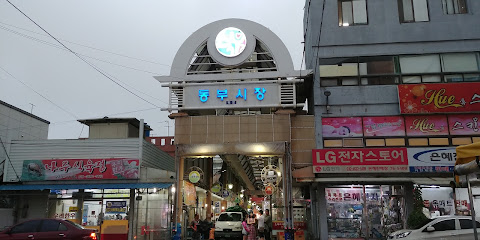
Kim Dae-jung Nobel Peace Prize Memorial
Discover the inspiring story of Kim Dae-jung at the Nobel Peace Prize Memorial, a must-visit museum in Mokpo-si, celebrating peace and democracy.
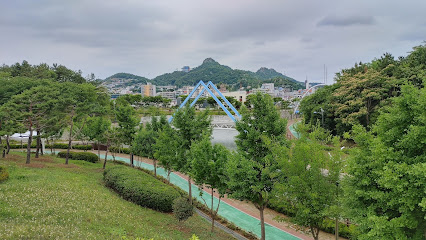
목포 스카이워크
Discover Mokpo's Cultural Landmark - A Must-Visit for Tourists Seeking Rich History and Local Arts in Jeollanam-do.
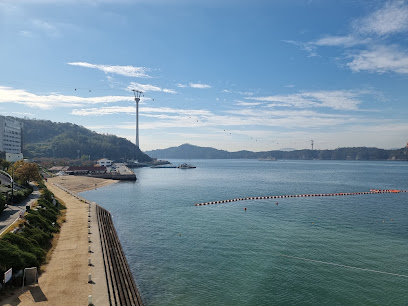
Gohado Observatory
Discover breathtaking views of Mokpo-si and the Yellow Sea at Gohado Observatory, a top destination for nature lovers and photographers.
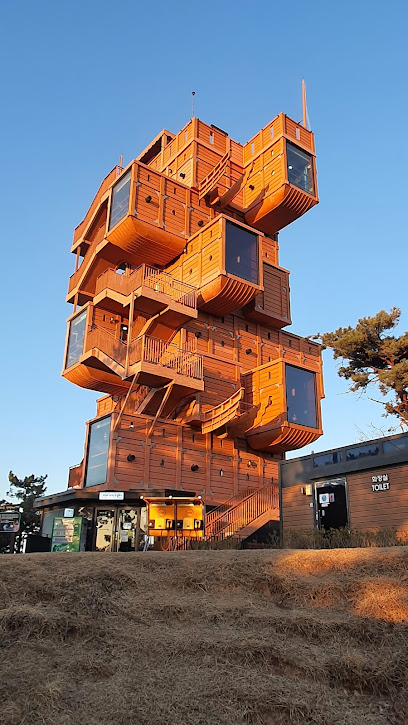
Nojeokbong Peak
Explore the breathtaking views and serene landscapes of Nojeokbong Peak, a natural park oasis in Mokpo-si, Jeollanam-do, South Korea.
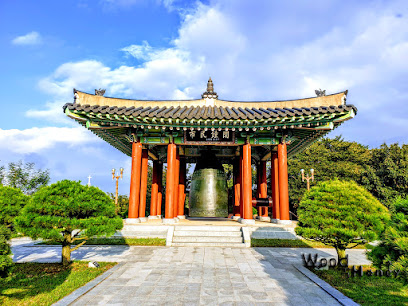
Yeonhee's Supermarket
Discover the vibrant atmosphere and local flavors at Yeonhee's Supermarket in Mokpo-si, a true gem of Jeollanam-do's culinary scene.
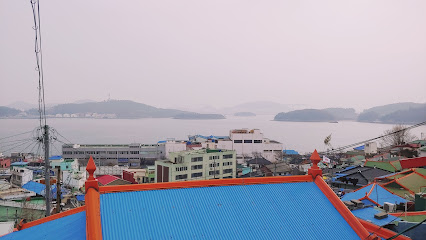
Yudalsan Sculpture Park
Explore the serene beauty of Yudalsan Sculpture Park in Mokpo-si, where art meets nature in a breathtaking outdoor setting.
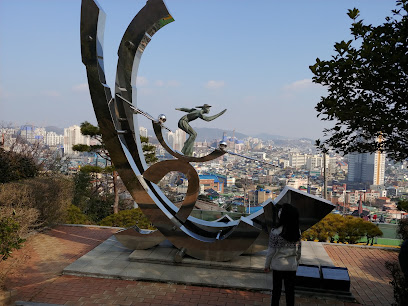
한솔문고 - 본점
Explore the heart of Mokpo at Hanam Books, a cozy bookstore that celebrates literature and local culture with a diverse collection and inviting atmosphere.
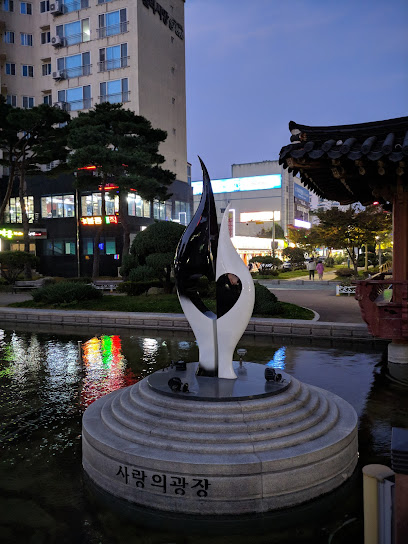
Unmissable attractions to see
Mokpo Cable Car Gohado Stop
Experience breathtaking views from above at Mokpo Cable Car Gohado Stop, a stunning mountain cable car overlooking Mokpo's scenic coastline and islands.
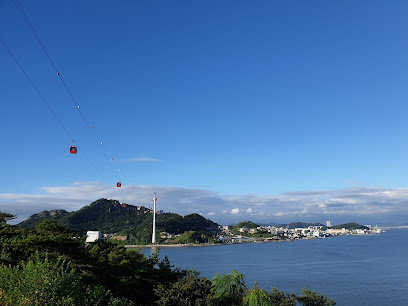
Mokpo Marine Cable Car
Discover stunning panoramic views and the beauty of Mokpo from above on the Mokpo Marine Cable Car, a unique mountain cable car experience.
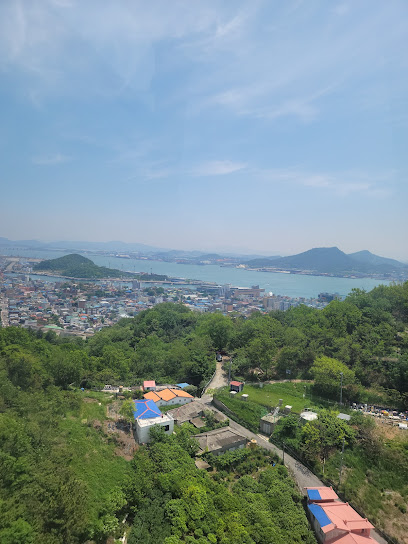
Mokpo Modern History Hall 1 (Former Mokpo Japanese Consulate)
Explore Mokpo's history at the Mokpo Modern History Hall, a museum showcasing the city's cultural evolution and historical significance.
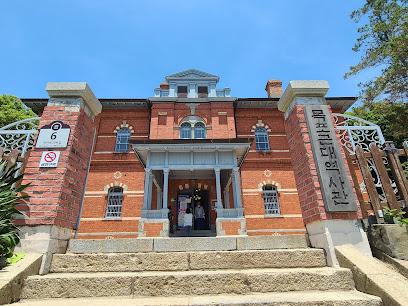
Mokpo Modern History Hall 1 (Former Mokpo Japanese Consulate)
Explore the rich historical tapestry of Korea at Mokpo Modern History Hall, where the past comes alive through captivating exhibits and stories.
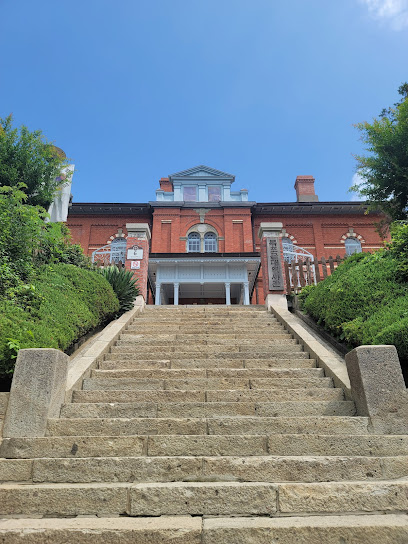
Mokpo Gatbawi Rock
Explore the breathtaking Mokpo Gatbawi Rock, a stunning nature preserve offering picturesque views and rich cultural significance in Jeollanam-do, South Korea.
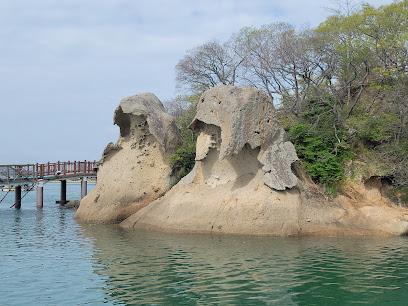
Mokpo Gatbawi Rock
Discover the breathtaking views and serene beauty of Mokpo Gatbawi Rock, a nature preserve that captivates visitors with its stunning landscapes and rich biodiversity.
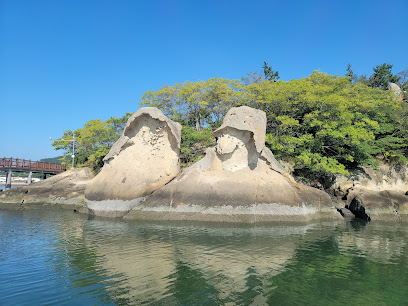
평화광장
Explore Mokpo's vibrant culture at Pyeonghwa Plaza, a hub of shopping, dining, and entertainment nestled in the heart of South Korea's coastal gem.
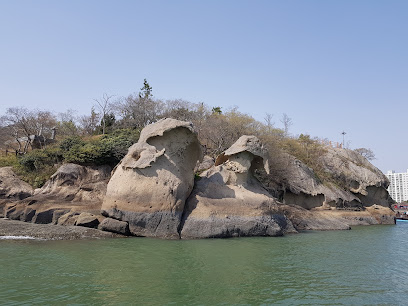
Mokpo Natural History Museum
Explore the Mokpo Natural History Museum and immerse yourself in the wonders of nature and biodiversity in the heart of Mokpo.
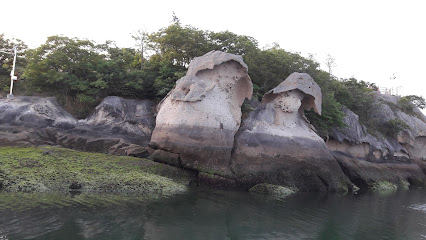
Kim Dae-jung Nobel Peace Prize Memorial
Explore the legacy of peace and democracy at the Kim Dae-jung Nobel Peace Prize Memorial in Mokpo-si, a must-visit for history enthusiasts.
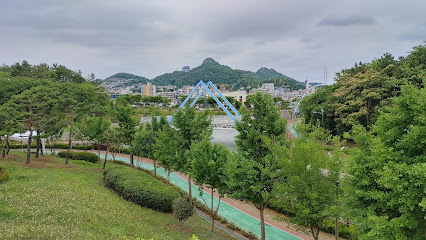
목포 스카이워크
Explore the Mokpo Cultural Landmark, where history meets vibrant culture in the heart of South Korea, offering breathtaking architecture and local traditions.
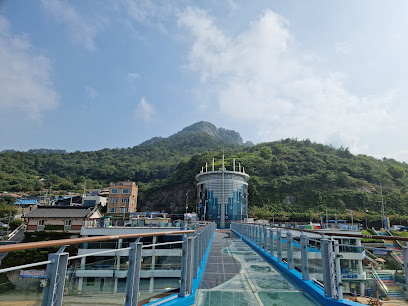
Mokpo Children's Sea Science Museum
Explore marine science like never before at Mokpo Children's Sea Science Museum, a family-friendly attraction in Jeollanam-do that sparks curiosity.
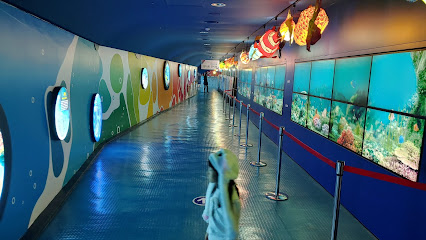
Gohado Observatory
Discover breathtaking views and serene landscapes at Gohado Observatory, a must-visit destination in Mokpo, Jeollanam-do, perfect for nature lovers and photographers.
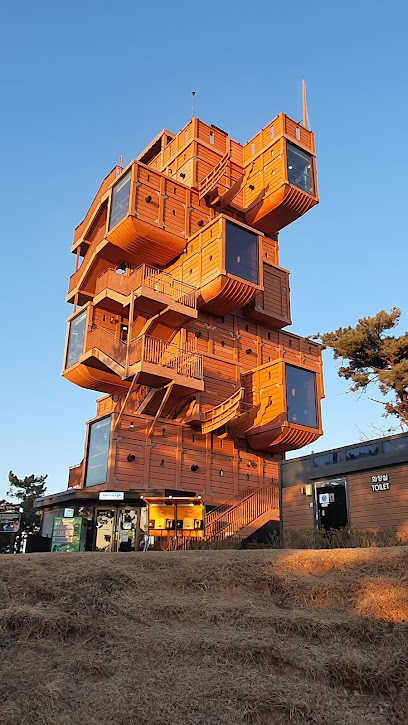
Nojeokbong Peak
Explore Nojeokbong Peak for breathtaking views, hiking trails, and serene nature in Mokpo, Jeollanam-do, a must-visit for every traveler.
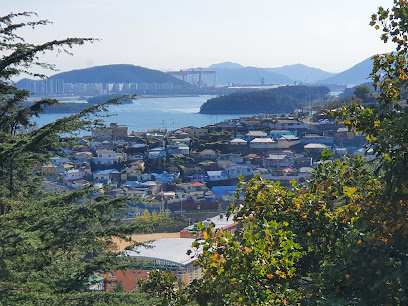
Yudalsan Sculpture Park
Discover Yudalsan Sculpture Park, where stunning art meets serene landscapes in Mokpo-si. A perfect destination for relaxation and inspiration.
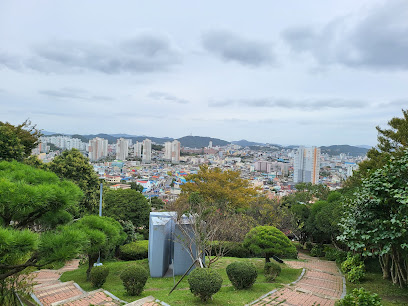
Mokpo Modern History Museum 2 (Former Oriental Development Company Mokpo Branch)
Explore Mokpo's vibrant history at the Mokpo Modern History Museum, a gateway to understanding Korea's cultural evolution and modernization.
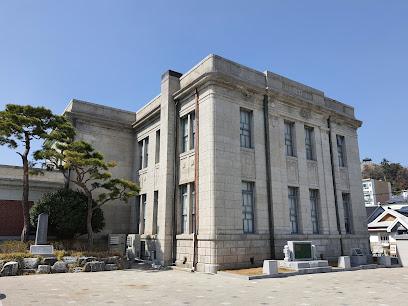
Essential places to dine
독천식당
Discover the authentic taste of Jeollanam-do at 독천식당 - where tradition meets flavor in every dish.
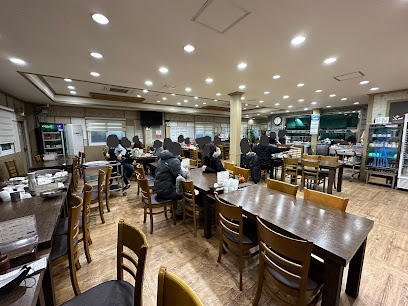
영란횟집
Experience authentic Korean seafood at 영란횟집 in Mokpo - where tradition meets flavor.
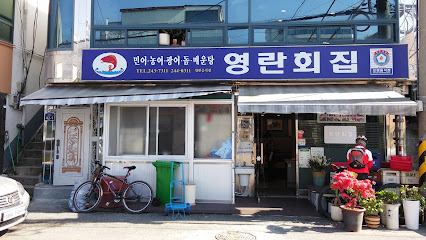
장터
Indulge in exquisite crab dishes at Mokpo's renowned 장터, where fresh flavors meet traditional Korean hospitality.
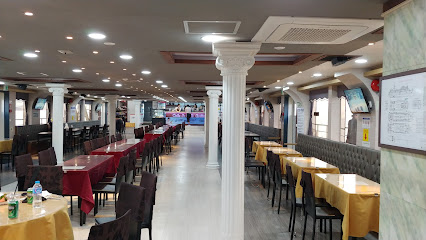
Seong Restaurant
Experience authentic Korean barbecue at Seong Restaurant in Mokpo - where flavor meets tradition in every bite.
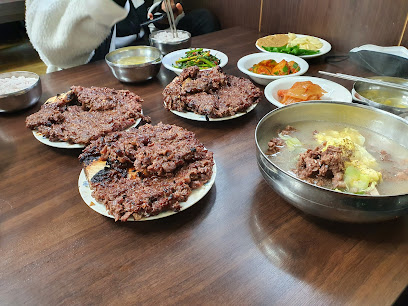
Haebim
Experience authentic Korean cuisine at Haebim in Mokpo, where tradition meets taste in a delightful dining atmosphere.
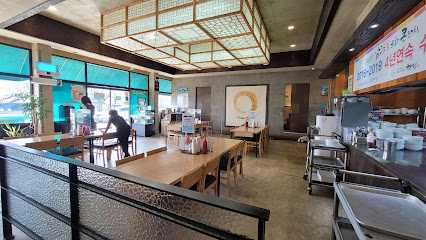
Yudal Kongmul Bean Noodle
Experience authentic Korean cuisine at Yudal Kongmul Bean Noodle—home of flavorful bean noodles in Mokpo-si's charming setting.
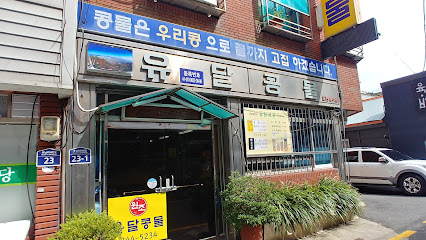
Manseon Restaurant
Experience the finest seafood dishes at Manseon Restaurant in Mokpo - where freshness meets tradition.
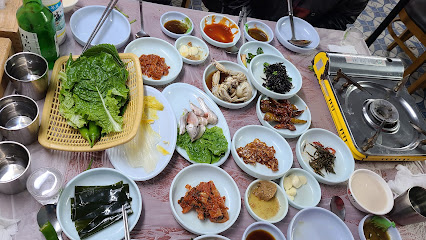
Ssugkkulle
Discover the essence of Korean cuisine at Ssugkkulle in Mokpo-si – where tradition meets innovation.
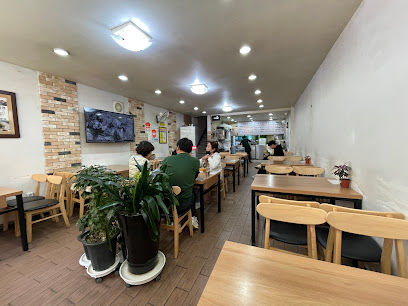
초원음식점
Discover the essence of Korean cuisine at 초원음식점 in Mokpo-si – where tradition meets flavor in every dish.
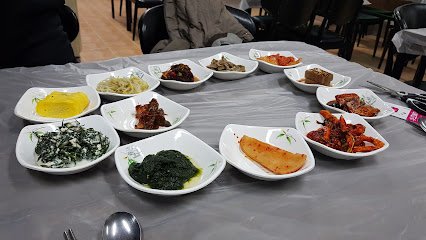
Baekseong Restaurant
Discover the heart of Korean cuisine at Baekseong Restaurant in Mokpo-si - where tradition meets taste in every bite.
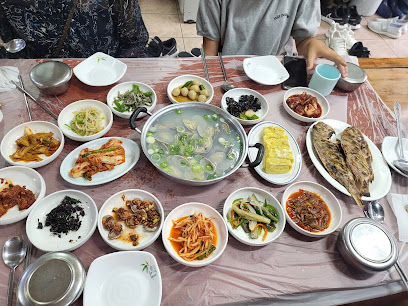
담은하늘채
Experience the essence of health with organic delights at 담은하늘채 - where nature meets flavor in Mokpo-si.
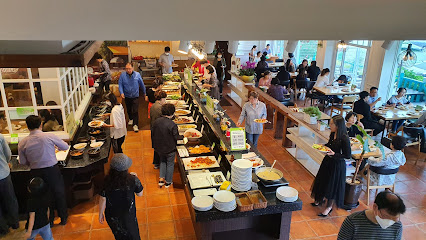
Curry Story (커리스토리)놔이사
Discover authentic Indian cuisine at Curry Story in Mokpo – where every dish tells a story of tradition and flavor.
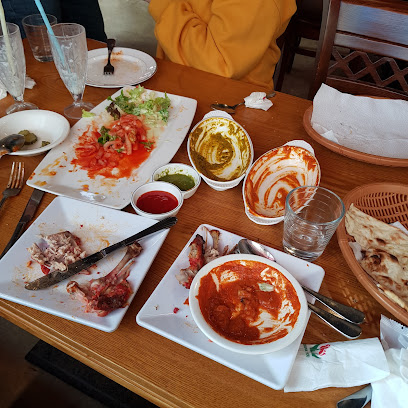
우렁쌈밥대패정식
Indulge in authentic Ssambap at 우렁쌈밥대패정식, Mokpo's top destination for fresh and flavorful Korean cuisine.
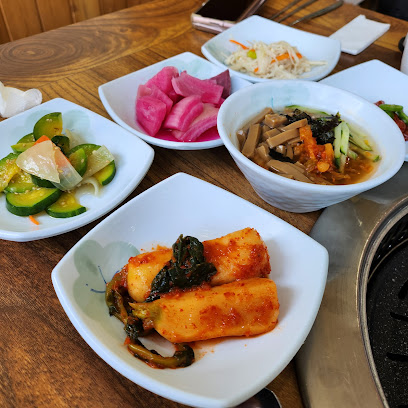
다원한정식
Savor authentic 한정식 at 다원한정식 in Mokpo-si, where tradition meets taste in every delightful dish.
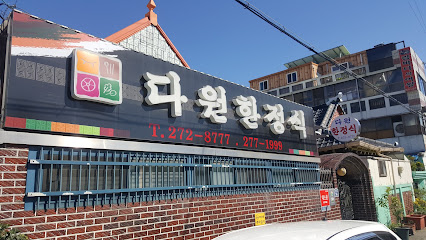
꽃담은소
Discover authentic Korean flavors at 꽃담은소, a beloved restaurant in Mokpo-si known for its warm ambiance and traditional cuisine.
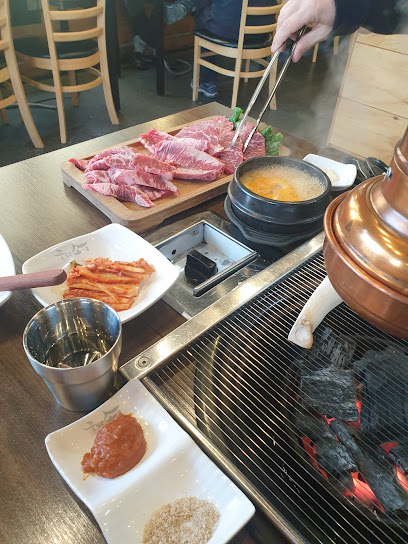
Markets, malls and hidden boutiques
Emart Mokpo
Discover the ultimate shopping experience at Emart Mokpo, where local culture meets convenience in a vibrant hypermarket setting.
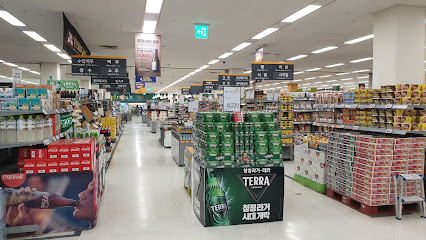
Colombang Bakery
Experience the delightful flavors of Mokpo at Colombang Bakery, a local gem serving fresh pastries and artisanal breads.
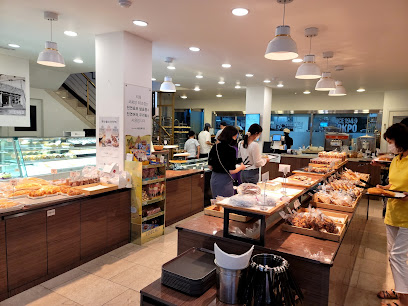
Daiso Mokpo Square Branch
Discover the charm of Daiso Mokpo Square, a treasure trove of affordable home goods and unique souvenirs in the heart of Mokpo-si.
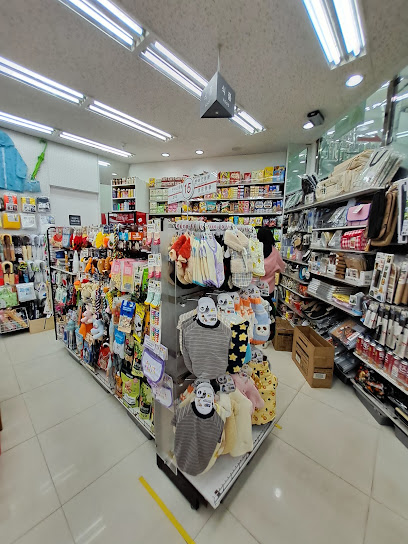
온 만두공방 | On Mandu Store
Savor the authentic taste of Korea at On Mandu Store, a delightful grocery store specializing in delicious mandu in Mokpo-si.
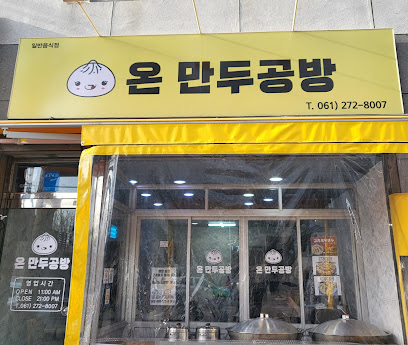
한살림 목포매장
Discover organic delights and sustainable living at Hansalim Mokpo, your go-to destination for fresh produce and eco-friendly home goods.
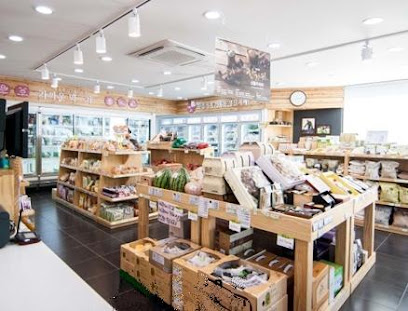
Yogulttug
Discover the charm of Yogulttug, Mokpo's cozy coffee shop offering delightful brews and a relaxing ambiance perfect for tourists.
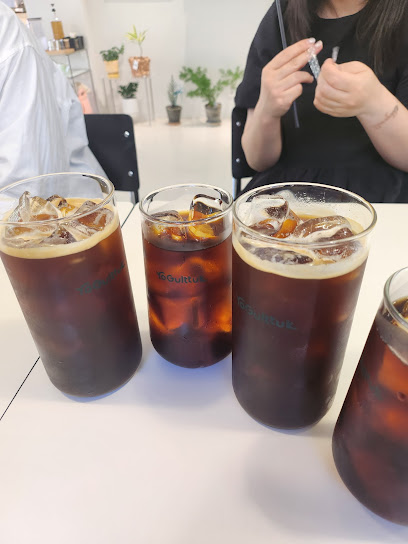
Mokpo Rodeo Street Christmas Tree Festival
Visit Mokpo Rodeo Street Christmas Tree Festival for an unforgettable festive experience filled with lights, joy, shopping, and local delights.

선물가게
Uncover unique Korean gifts and souvenirs at 선물가게, a charming novelty store in Mokpo-si that reflects local culture and creativity.
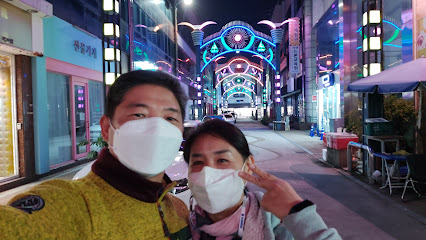
목포
Experience Mokpo: A dynamic shopping destination in South Korea with a rich cultural backdrop and delicious local cuisine.

BK
Explore an exquisite selection of beauty products at BK, Mokpo's premier cosmetic store, where quality meets customer satisfaction.

시즌글라스 목포점
Discover local flavors and authentic Korean ingredients at 시즌글라스 목포점 in Mokpo-si, Jeollanam-do.

험멜 목포점
Discover the latest trends in fashion at 험멜 목포점, a stylish clothing store in Mokpo-si, Jeollanam-do, perfect for trendy tourists.

패션소나
Explore the latest fashion trends at Fashion Sona, Mokpo's premier clothing store, where style meets affordability and local charm.

다판다 목포지점
Explore the vibrant health food scene at 다판다 목포지점 in Mokpo, where delicious nutrition meets the rich cultural landscape of Jeollanam-do.

목포 레노마레이디스
Explore Mokpo Renoma Ladies for stylish women's clothing that blends modern trends with Korean culture, all in the charming ambiance of Rose Street.

Essential bars & hidden hideouts
밤도깨비
Immerse yourself in Mokpo's nightlife at 밤도깨비, where vibrant energy meets a delightful selection of local drinks.
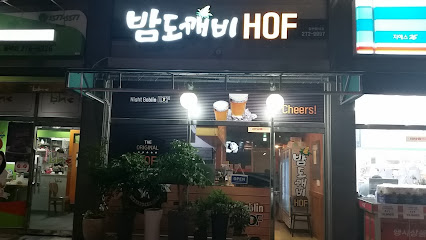
Moe’s bar & Tattoo Space
Discover the artistic fusion of nightlife and tattoo culture at Moe’s Bar & Tattoo Space in Mokpo-si, Jeollanam-do.
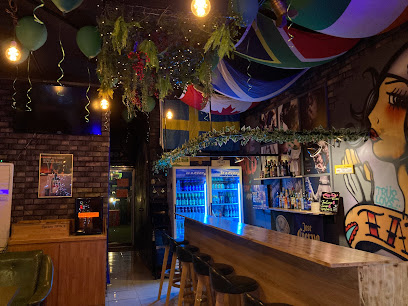
알짜비어
Experience the vibrant nightlife of Mokpo at 알짜비어, a cozy bar perfect for unwinding with friends and enjoying local drinks.
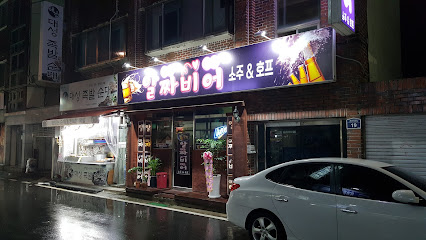
Senseu
Experience the vibrant nightlife of Mokpo-si at Senseu Bar, where great drinks and a lively atmosphere await.

Baengnyeon bar
Discover the vibrant nightlife at Baengnyeon Bar in Mokpo-si, where expertly crafted drinks and a lively atmosphere await every visitor.
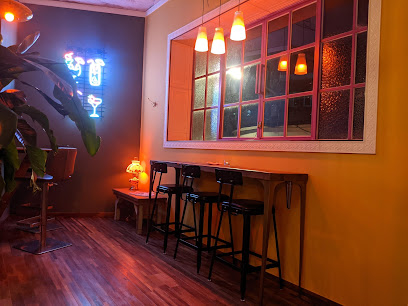
Beullu
Experience Mokpo's vibrant nightlife at Beullu, a lively bar offering local flavors and a welcoming atmosphere for tourists and locals alike.

Homaeg
Discover the lively spirit of Mokpo at Homaeg, where local flavors and a vibrant atmosphere come together in a unique bar experience.
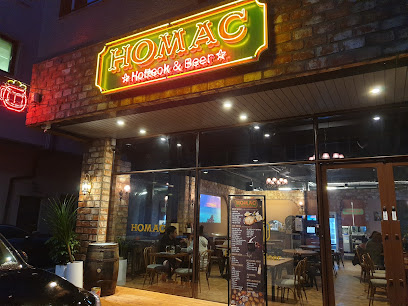
바바호프
Discover the vibrant nightlife of Mokpo-si at 바바호프, a lively bar offering a unique blend of local charm and entertainment.

에스에스
Discover the lively charm of Mokpo's nightlife at 에스에스 Pub, where locals gather for great drinks and good company.
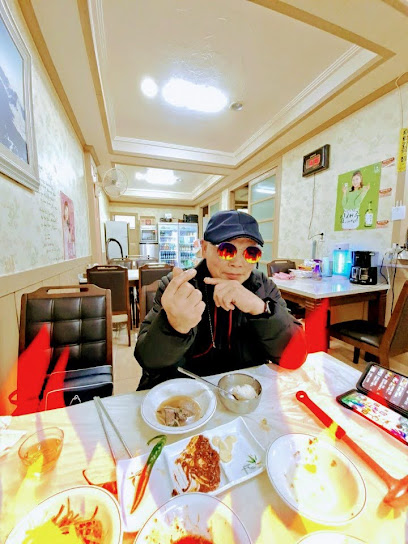
스타호프
Discover the unique atmosphere of 스타호프 in Mokpo-si, a delightful bar perfect for unwinding and enjoying local beverages.

Janglong
Discover Janglong, Mokpo's premier wine bar, where exquisite wines and a cozy ambiance come together for an unforgettable experience.

스카이룩
Discover Sky Look, Mokpo's scenic bar offering stunning views, vibrant atmosphere, and delightful drinks, perfect for a memorable night out.

노적봉스텐드빠
Discover the vibrant nightlife at 노적봉스텐드빠 in Mokpo-si, where locals and tourists alike gather for drinks, music, and good times.

비어하우스
Discover the vibrant nightlife of Mokpo at 비어하우스, a lively bar offering local brews and a cozy atmosphere perfect for unwinding.

Local Phrases
-
- Hello안녕하세요
[an-nyeong-ha-se-yo] - Goodbye안녕히 가세요
[an-nyeong-hi ga-se-yo] - Yes네
[ne] - No아니요
[a-ni-yo] - Please/You're welcome제발/천만에요
[je-bal/cheon-man-e-yo] - Thank you감사합니다
[gam-sa-ham-ni-da] - Excuse me/Sorry죄송합니다
[joe-song-ham-ni-da] - How are you?어떻게 지내세요?
[eo-tteo-ke ji-nae-se-yo?] - Fine. And you?잘 지내고 있어요. 당신은요?
[jal ji-nae-go i-sseo-yo. dang-si-neun-yo?] - Do you speak English?영어를 하실 줄 아세요?
[yeong-eo-reul ha-shil jul a-se-yo?] - I don't understand이해하지 못해요
[i-hae-ha-ji mot-hae-yo]
- Hello안녕하세요
-
- I'd like to see the menu, please메뉴를 보고 싶어요
[me-nyu-reul bo-go ship-eo-yo] - I don't eat meat고기를 먹지 않아요
[go-gi-reul meok-ji a-na-yo] - Cheers!건배!
[geon-bae!] - I would like to pay, please계산할게요
[gye-san-hal-ge-yo]
- I'd like to see the menu, please메뉴를 보고 싶어요
-
- Help!도와주세요!
[do-wa-ju-se-yo!] - Go away!가세요!
[ga-se-yo!] - Call the Police!경찰을 불러주세요!
[gyeong-chal-eul bul-leo-ju-se-yo!] - Call a doctor!의사를 불러주세요!
[ui-sa-reul bul-leo-ju-se-yo!] - I'm lost길을 잃었어요
[gil-eul ilh-eoss-eo-yo] - I'm ill아파요
[a-pa-yo]
- Help!도와주세요!
-
- I'd like to buy...사고 싶어요...
[sa-go ship-eo-yo...] - I'm just looking둘러보고 있어요
[dul-leo-bo-go i-sseo-yo] - How much is it?얼마에요?
[eol-ma-e-yo?] - That's too expensive너무 비싸요
[neo-mu bi-ssa-yo] - Can you lower the price?가격을 깎을 수 있어요?
[ga-gyeok-eul kka-keul su i-sseo-yo?]
- I'd like to buy...사고 싶어요...
-
- What time is it?몇 시예요?
[myeot si-ye-yo?] - It's one o'clock한 시예요
[han si-ye-yo] - Half past (10)열 시 반
[yeol si ban] - Morning아침
[a-chim] - Afternoon오후
[o-hu] - Evening저녁
[jeo-nyeok] - Yesterday어제
[eo-je] - Today오늘
[o-neul] - Tomorrow내일
[nae-il] - 1하나
[ha-na] - 2둘
[dul] - 3셋
[set] - 4넷
[net] - 5다섯
[da-seot] - 6여섯
[yeo-seot] - 7일곱
[il-gop] - 8여덟
[yeo-deol] - 9아홉
[a-hop] - 10열
[yeol]
- What time is it?몇 시예요?
-
- Where's a/the...?...이 어디에 있어요?
[...i eo-di-e iss-eo-yo?] - What's the address?주소가 뭐에요?
[ju-so-ga mwo-e-yo?] - Can you show me (on the map)?(지도에) 보여줄 수 있어요?
[(ji-do-e) bo-yeo-jul su i-sseo-yo?] - When's the next (bus)?다음 (버스)는 언제 와요?
[da-eum (beo-seu)-neun eon-je wa-yo?] - A ticket (to ....)표 하나 주세요 (....으로)
[pyo ha-na ju-se-yo (....eu-ro)]
- Where's a/the...?...이 어디에 있어요?
History of Mokpo
-
Mokpo, located in the southwestern part of South Korea, has a rich history dating back to the Goryeo Dynasty. Its strategic location along the coast made it a significant port for trade and fishing. The city began as a small fishing village and gradually evolved into a bustling port city due to its natural harbor and access to maritime routes.
-
During the Japanese occupation of Korea from 1910 to 1945, Mokpo became a critical point for Japanese military and economic activities. The city saw substantial infrastructural development, including the construction of the Mokpo Station in 1913, which still stands today as a historical site. This period also witnessed the establishment of various modern facilities, roads, and buildings.
-
In the Korean War (1950-1953), Mokpo served as an essential logistical hub for the South Korean and United Nations forces. Its port was used to transport troops and supplies, making it a target for North Korean attacks. The city's resilience during this tumultuous period is a testament to its strategic importance.
-
After the Korean War, Mokpo underwent significant reconstruction and modernization efforts. The city expanded its infrastructure, including roads, bridges, and public facilities. It also saw a surge in economic activities, particularly in the fishing and shipping industries. The establishment of the Mokpo National Maritime Museum in 1994 further highlighted the city's maritime heritage.
-
Mokpo has always been a cultural hub, but recent decades have seen a revival in its artistic and cultural scene. The Mokpo Modern History Museum, housed in a former Japanese consulate building, offers insights into the city's past. Annual events like the Mokpo Maritime Cultural Festival celebrate the city's rich history and maritime culture. The city's unique blend of historical architecture and modern developments make it a captivating destination for visitors.
-
The city's natural beauty, including Yudal Mountain and the surrounding archipelago, has made it a popular tourist destination. Mokpo's waterfront parks, scenic hiking trails, and historical sites offer a diverse range of attractions for visitors. The city's development of tourism infrastructure has further solidified its status as a key destination in southwestern South Korea.
Mokpo Essentials
-
Mokpo is located in the southwestern part of South Korea. The nearest international airport is Muan International Airport, about a 30-minute drive from Mokpo. Alternatively, you can fly into Incheon International Airport and take a KTX (Korea Train Express) high-speed train, which takes approximately 2.5 to 3 hours. Buses and intercity trains also connect Mokpo to other major cities in South Korea.
-
Mokpo boasts a well-connected public transport system. Local buses are frequent and cover most parts of the city. Taxis are readily available and relatively inexpensive. For a more flexible option, consider renting a car. Mokpo's waterfront and central areas are also pedestrian-friendly, making walking a pleasant way to explore the city.
-
The official currency in South Korea is the South Korean Won (KRW). Credit and debit cards are widely accepted in Mokpo, including in hotels, restaurants, and shops. However, it is advisable to carry some cash, especially for smaller vendors and markets. ATMs are widely available, but make sure your card is compatible with Korean banking systems.
-
Mokpo is generally a safe city for tourists. However, like any travel destination, it is wise to take standard safety precautions. There are no specific high-crime areas targeting tourists, but always keep an eye on your belongings, especially in crowded places. Avoid walking alone in poorly lit areas at night.
-
In case of an emergency, dial 112 for police assistance and 119 for fire or medical emergencies. Mokpo has several hospitals and clinics equipped to handle medical emergencies. It is recommended to have travel insurance that covers medical issues. Pharmacies are readily available for minor health concerns and over-the-counter medications.
-
Fashion: Do dress modestly, especially when visiting temples or traditional sites. Avoid overly revealing clothing. Religion: Do show respect when visiting religious sites; remove your shoes and avoid loud conversations. Public Transport: Do give up your seat for elderly and disabled passengers. Don’t eat or drink on public transport. Greetings: Do greet people with a bow or a handshake. A slight nod of the head is also respectful. Eating & Drinking: Do try local foods and accept food offerings graciously. Don’t refuse hospitality, as it is considered impolite.
-
To experience Mokpo like a local, visit the Mokpo Wholesale Fish Market early in the morning for fresh seafood. Engage with the locals, who are often friendly and willing to share their stories. Don’t miss the Mokpo Marine Cable Car for spectacular views of the city and surrounding islands. Enjoy a leisurely walk along the Mokpo Gatbawi Rock to appreciate the natural beauty of the area.
-
Mokpo experiences a temperate climate with four distinct seasons. Spring (April to June) and autumn (September to November) are the best times to visit, offering mild weather and beautiful landscapes. Summers can be hot and humid, while winters are cold but generally dry.
-
The official language in Mokpo is Korean. While English is not widely spoken, younger generations and those in the tourism industry may understand basic English. It is helpful to learn a few basic Korean phrases or carry a translation app for easier communication.
Trending Landmark in Mokpo
-
Mokpo Cable Car Gohado Stop
-
Mokpo Marine Cable Car
-
Mokpo Modern History Hall 1 (Former Mokpo Japanese Consulate)
-
Mokpo Gatbawi Rock
-
평화광장
-
Hotel Hyundai by Lahan Mokpo
-
Mokpo Natural History Museum
-
동부시장
-
Kim Dae-jung Nobel Peace Prize Memorial
-
목포 스카이워크
-
Gohado Observatory
-
Nojeokbong Peak
-
Yeonhee's Supermarket
-
Yudalsan Sculpture Park
-
한솔문고 - 본점
Nearby Cities to Mokpo
-
Things To Do in Gwangju
-
Things To Do in Suncheon
-
Things To Do in Jeonju
-
Things To Do in Jeju City
-
Things To Do in Daejeon
-
Things To Do in Daegu
-
Things To Do in Busan
-
Things To Do in Ulsan
-
Things To Do in Suwon
-
Things To Do in Gyeongju
-
Things To Do in Andong
-
Things To Do in Incheon
-
Things To Do in Pohang
-
Things To Do in Seoul
-
Things To Do in Chuncheon











